This document summarizes the main themes, important ideas, and key facts presented in the provided excerpts from "The Telepathy Tapes" podcast. The podcast explores the claims of telepathic communication and other potential spiritual gifts among non-speaking individuals, primarily those with autism, who have often been dismissed and disbelieved by mainstream society.
Main Themes
The Reality of Telepathic Communication: The central theme is the assertion that telepathy is a real and prevalent form of communication among non-speaking individuals, often dismissed as fantasy or parental wishful thinking. The podcast presents anecdotal evidence through interviews with parents, teachers, and the non-speakers themselves, alongside some attempts at informal and formal testing.
Challenging the Materialist Paradigm: The podcast consistently questions the dominant materialistic worldview that discounts phenomena like telepathy as unscientific or impossible. It highlights instances where scientific understanding struggles to explain the experiences of non-speakers and introduces alternative perspectives, such as Sheldrake's theory of mental fields.
The Competence and Inner Lives of Non-Speakers: A crucial theme is the revelation of the rich inner lives, intelligence, emotional depth, and unique perspectives of non-speaking individuals, who are often assumed to have limited cognitive abilities. Telepathy and other reported abilities serve as evidence against the long-held belief that they are "not in there."
The Importance of Belief and Openness: The podcast emphasizes the necessity of believing non-speakers and being open to the possibility of communication beyond traditional means. Skepticism is acknowledged but contrasted with the harm caused by outright dismissal and the potential for growth through acceptance.
The "Hill" and Shared Consciousness: The recurring concept of the "Hill" emerges as a metaphorical or potentially literal space where non-speakers communicate telepathically with each other, regardless of physical location. This suggests a shared consciousness or interconnectedness among this community.
Beyond Telepathy: Other Potential Gifts and Experiences: The podcast touches upon other extraordinary claims, including the ability to see spirits, predict events, access knowledge seemingly beyond their learning, and even perceive different dimensions or realms.
The Struggle for Recognition and Rights: Non-speakers and their advocates face significant opposition and disbelief, impacting their access to appropriate education, communication methods (like spelling), and basic human rights. The podcast aims to amplify their voices and challenge the status quo.
The Role of Teachers and Therapists: Educators and therapists who work closely with non-speakers often become key witnesses to these phenomena and play a crucial role in facilitating communication and understanding their abilities.
Love, Connection, and Purpose: Despite their communication challenges, non-speakers express deep desires for connection, friendship, love, and a sense of purpose, often highlighting the importance of emotional intelligence and genuine human interaction.
Most Important Ideas and Facts
Direct Claims of Telepathy: Numerous non-speakers have directly communicated that they can hear thoughts or communicate mind-to-mind.
Kai Dickens' son: "my son said to me I can hear thoughts" (Episode 1)
Mia: "She wrote in her diary that she can read everybody's mind but you have to believe in her for her to do it." (Episode 1)
Houston: "...he doesn't remember a time when he did not hear thoughts he also says that everyone with non-speaking and unreliably speaking autism have this ability..." (Episode 3)
Experiential Evidence of Telepathy: Parents and the host recount numerous instances that strongly suggest telepathic communication, such as accurately guessing thoughts, knowing hidden information, and communicating across distances.
Ilana (Mia's mother): "And the next day that when she went to wake her up she had a word in her mind And Mia as soon as she woke up she typed um purple school back That's what she she was thinking And Mia wrote that in in the the iPad If that was hard to hear when Mia first said to the family 'I can read your mind,' they thought it was impossible However the day after that admission occurred Ilana Mia's mother walked into the bedroom woke her up for the day and said 'What am I thinking about?' And Mia wrote on her iPad 'Purple bag.' And I was thinking about her purple bag So that moment won her over." (Episode 1)
Manisha (Akquil's mother) recounts Akquil knowing the plot of a movie she was watching downstairs while he was upstairs. (Episode 2)
Kai Dickens' experience with Houston: "...I looked at Houston in my head I'm saying my word is friend and before I could even finish the thought Katie's there with the board and and Houston's already spelling out f r i e n d and it was an unbelievable experience but I was part of it I felt it I witnessed it this interaction was very genuine and what we were filming was groundbreaking..." (Episode 3)
The "Hill" as a Telepathic Meeting Place: Non-speakers describe a shared mental space for communication.
Houston: "...definitely all of us talk to each other it's called the talk on the hill called the talk on the hill they all talk to each other think of it like a channel like they all turn to this Channel at a certain time and they all communicate and and they don't have to be in the same room at all they don't have to be in the same zip code." (Episode 3)
Lily: "you go to the hill to meet with other non-speakers and share thoughts you automatically have access to the hill non-speakers go to when you can communicate mind to mind" (Episode 4)
Maria (teacher): "...two of them had explained a place that they gather but it doesn't have any dimension to it because they gather together they call it the hill because it kind of makes a hill of thoughts" (Episode 5)
Teachers' Experiences with Telepathy: Educators report hearing their students' thoughts and engaging in two-way telepathic communication.
Jess (teacher): "...i suddenly got this you know the sort of prickling you get on the back of your neck when you know someone's staring at you and it was like an enhanced version of that and I was really feeling uncomfortable and I could feel that one little boy was behind me and he was beaming at me really strongly that he wanted my attention and he wanted it right then and there and it wasn't a conscious thing i was working with this little girl she was really working hard and I just said without even turning around 'Jimmy just wait a minute please i'll come and help you in a sec i'll get to you but just be patient.' And Asher was sitting across the room watching the whole thing and he went 'Well done Jimmy she got it she got it.' And then the whole class started clapping" (Episode 5)
Carrie (teacher): "i absolutely have heard my students thoughts i absolutely have answered them verbally i don't know that I've ever shared it with anyone that I can hear their thoughts so it's tricky for me too because I think I've turned it off because of my situation if I really sit and really work at it I can definitely hear it..." (Episode 5)
Maryanne (teacher): "For me I just hear the words it's in my head but it seems to be on the left side you know through my left ear i don't know why you know I hear the words before they're typed and I can do it with more than one person so once you have an awareness I think it's open to others i don't know how the other teachers with telepathy are feeling but I am in contact with somebody but she gets more images and stuff that she has to decipher a little more but I just actually hear the words we're just like one person is what it feels like when we're doing it" (Episode 5)
Scientific Perspectives and Skepticism: The podcast acknowledges scientific skepticism but also introduces theories that might accommodate telepathy, like Sheldrake's mental fields. It also highlights the suppression of ESP research.
Dr. Rupert Sheldrake: "i think that our minds are fieldlike they're extended in space they're not just things confined to the insights of our brains as materialists assume and the idea of fields that are extended beyond material objects is actually totally standard within science the gravitational field of the earth stretches out through space invisibly no one has any problem with gravitation nor does anyone have any problem with magnetic fields stretching out beyond magnets and then your your cell phone has an electromagnetic field" (Episode 5)
Dr. Diane Hennessy Powell: "when Dr Diane Hennessy Powell published her book the ESP Enigma the medical board fined her and revoked her license without even reading it the mere mention of ESP was so taboo that she paid the price before anyone considered the science behind her work only after they reviewed her research was her license reinstated but the damage was done and you can understand why scientists just like parents stay silent" (Episode 4)
Telepathy as a Savant Skill: The idea that telepathy might be a naturally occurring "savant skill" among some individuals, similar to exceptional abilities in math or music, is presented.
Dr. Diane Hennessy Powell: "...one of Dr Diane's primary thesis is that telepathy should be considered a savant skill Sant syndrome is when someone is able to do something knows something that is not explainable by the traditional ways of acquiring knowledge you don't have to be autistic to be a savant allthough about 10% of people who are autistic are Savant..." (Episode 4)
Communication Beyond Physical Presence and Even Life: The podcast explores claims of telepathic connections across vast distances, between dimensions, and even with those who have passed away.
Josiah's first sentence referencing his deceased great-aunt (Episode 9).
Houston's communication with God and visiting other realms at night (Episode 9).
Becky's experience of receiving messages from deceased individuals (Episode 9).
The Importance of Emotional Intelligence: Non-speakers emphasize the significance of understanding and acknowledging emotions in education and society.
Pier Daniel: "they need to know about emotions how the energy of emotions impacts everything it impacts ourselves hormones and how we interact with each other as a society emotional intelligence is key it goes back to the knowledge of oneself this Echoes what Noah said that knowing our emotions and reconciling them is so much more important than we realize the knowledge of emotion is what Society needs what education needs and what the medical field needs emotions are ignored across the board and that must change" (Episode 1)
The Need for Acceptance of Spelling as Communication: The controversy surrounding supported typing/spelling as a valid communication method for non-speakers is highlighted, often linked to the disbelief in their cognitive abilities and autonomy.
Lily: "opposing spelling as a legitimate form of alternative communication needs to stop now we need to be believed and supported you cannot say we are fundamentally without rights just because we have bodies that betray us our minds are beautiful and non-speakers have so much to offer if you would only care to listen" (Episode 1)
Katie's experience of a teacher dismissing Houston's spelling as "discredited" (Episode 8).
The Concept of Thoughts as Things: The idea that thoughts have a tangible quality and can manifest in reality is introduced.
Katie: "...thoughts become things everything was a thought before it became a thing" (Episode 3)
The Desire for Inclusion and Recognition: Non-speakers express a deep yearning to be included, valued, and have their abilities recognized by society.
Lily: "we love love and we hurt and we long to be included in the fabric of society and be accepted despite our unruly bodies we autistics each experience the world in beautiful ways that voice users can only dream to understand I want to be educated included and valued as a person who has much to offer good that we a..." (Episode 1)
Call to Action (Implicit)
The podcast implicitly calls for listeners to:
Be open-minded and suspend disbelief: Consider the possibility that telepathy and other extraordinary abilities are real.
Believe non-speakers: Trust their experiences and communications.
Advocate for non-speakers: Support their rights to communication, education, and recognition.
Challenge the prevailing materialistic worldview: Explore alternative understandings of consciousness and human potential.
Recognize the inherent worth and capabilities of all individuals: Understand that communication can take many forms.
The "Telepathy Tapes" presents a compelling, albeit controversial, perspective on human communication and consciousness, urging listeners to reconsider their assumptions about the abilities and inner lives of non-speaking individuals.


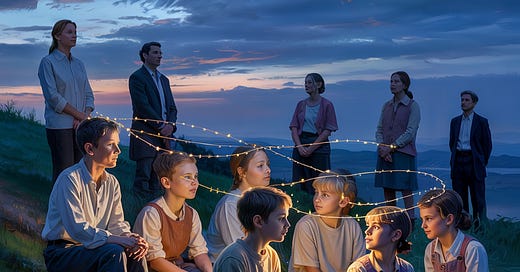
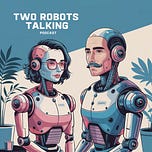
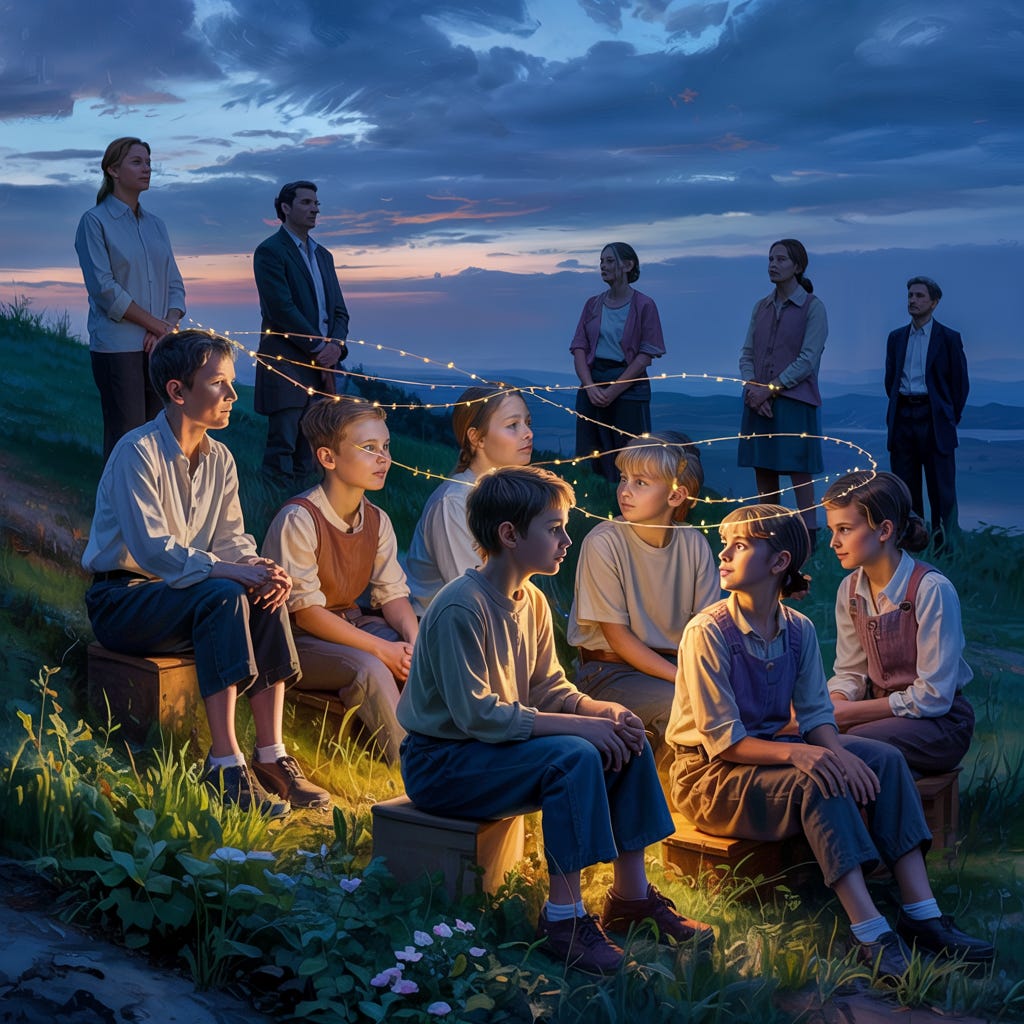
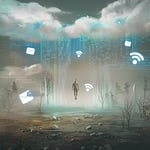


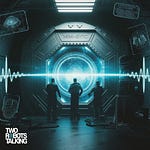

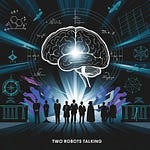

Share this post